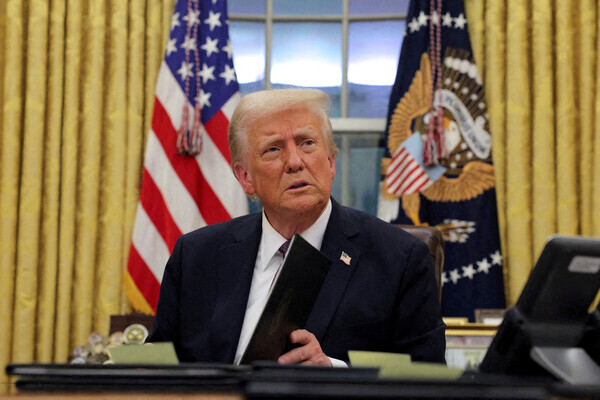
WASHINGTON D.C. – President Donald Trump's second term, heralded with promises of peace and swift resolutions to ongoing conflicts, is quickly unraveling as his unique brand of diplomacy yields more chaos than calm. The president's pledges to end the wars in Ukraine and Gaza within his first 100 days are facing stark realities, marked by unilateral decisions and a disregard for established international norms.
Trump's initial approach to the Russia-Ukraine conflict involved pushing for a peace deal that heavily favored Russia, demanding Ukraine cede Crimea and occupied territories without any security guarantees. This was coupled with a controversial request for access to Ukraine's mineral resources as a condition for U.S. mediation. The February 28 summit between Trump and Ukrainian President Volodymyr Zelenskyy highlighted the growing rift, with Trump dismissing Zelenskyy's demands and subsequently suspending military aid to Ukraine, shifting the negotiation leverage decisively towards Russia.
"Don't order us around. You have no cards to play," Trump reportedly told Zelenskyy, a stark departure from traditional diplomatic protocols. The president's actions suggest a belief in the "survival of the fittest" approach to international relations, where powerful nations dictate terms to weaker ones.
As the 100-day mark approaches, Trump has also begun to apply pressure on Russian President Vladimir Putin, hinting at "second-round sanctions" despite his earlier pro-Russia stances. However, analysts argue that Putin, confident in his battlefield advantages and U.S. support, sees no urgency in agreeing to a swift resolution.
The Gaza conflict mirrors this pattern of unilateral action. Trump's suggestion to "take over Gaza and turn it into the Middle East's Riviera" following a meeting with Israeli Prime Minister Benjamin Netanyahu shocked international observers. This rhetoric, coupled with the U.S. negotiation team's perceived incompetence, has stalled ceasefire talks and contributed to the resurgence of violence.
Steve Witkoff, the White House Middle East envoy, has been criticized for uncritically echoing Russian propaganda, further undermining the U.S.'s credibility as a neutral mediator. His assertion that "Eastern Ukraine wants to be annexed by Russia," based on potentially manipulated referendums, exemplifies the administration's disregard for nuanced diplomacy.
Critics argue that Trump's territorial ambitions and disregard for international norms signal a significant shift in U.S. foreign policy. The British Economist warned that these actions confirm the U.S.'s abandonment of its role as the guardian of the post-war free trade order, potentially emboldening hegemonic actions by nations like China and Russia.
"This is not just about isolated incidents; it's a systemic shift," said a senior European diplomat, speaking on condition of anonymity. "The U.S. is undermining the very foundations of international cooperation."
As Trump's second term progresses, the world watches with increasing concern, questioning whether his "peace" promises will ever materialize or if they will further destabilize an already volatile global landscape.
[Copyright (c) Global Economic Times. All Rights Reserved.]






























